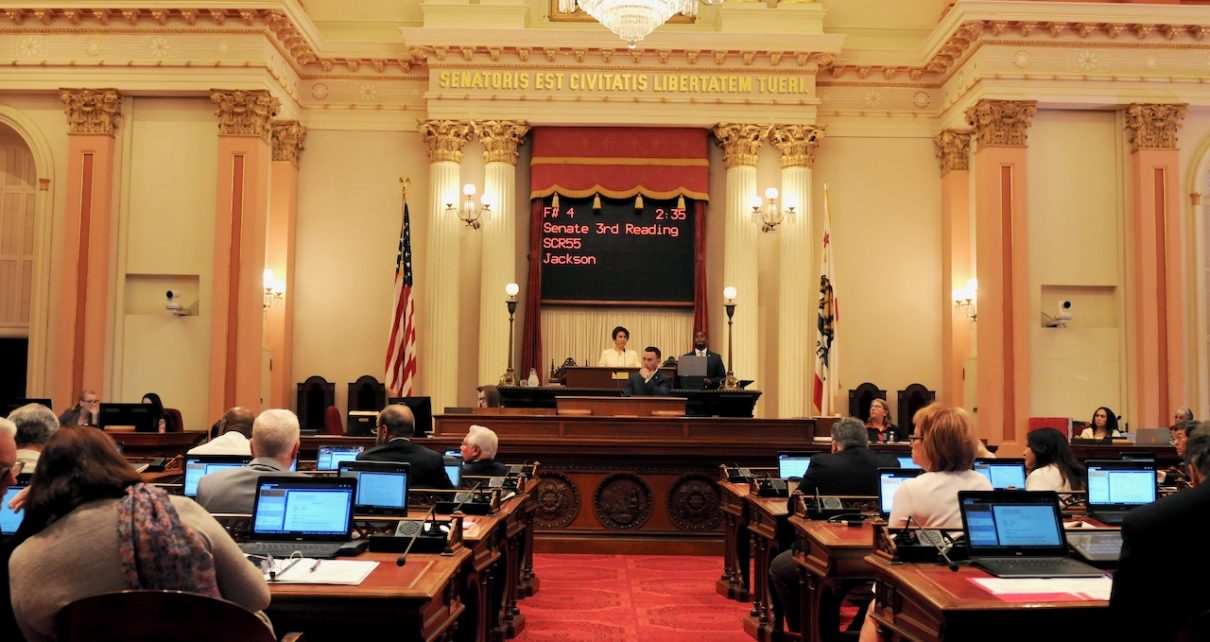
California State Senate. (Photo: Kevin Sanders for California Globe)
California Private Student Loan Collections
Law protects California debtors who have unpaid private student loans
By Chris Micheli, August 5, 2022 3:28 pm
California has a number of formal acts in statute. Civil Code Division 3, Part 4, Title 1.6C.15 provides the Private Student Loan Collections Reform Act, which is contained in Sections 1788.200 to 1788.211. Title 1.6C.15 was added in 2021 by Chapter 559. Section 1788.20 names the Act.
Section 1788.201 provides definitions for the following terms: “borrower”; “student loan borrower”; “consumer report”; “consumer reporting agency”; “cosigner”; “creditor”; “debtor” “exempt entity”; “original creditor”; “private education lender”; “private education loan”; “private education loan collection action”; and, “private education loan collector.”
Section 1788.202 prohibits a private education lender or a private education loan collector from making any written statement to a debtor in an attempt to collect a private education loan unless the private education lender or private education loan collector possesses specified information, including 18 items.
Section 1788.203 requires all settlement agreements between a private education lender or private education loan collector and a debtor to be documented in open court or otherwise reduced to writing. The private education lender or private education loan collector must ensure that a copy of the written agreement is provided to the debtor.
Section 1788.204 prohibits a private education loan collector from bringing suit or initiating an arbitration or other legal proceeding to collect a private education loan if the applicable statute of limitations for the private education lender’s or private education loan collector’s claim has expired.
Section 1788.205 provides that, in an action brought by a private education lender or private education loan collector to collect a private education loan, the complaint must allege specified information.
Section 1788.206 provides that, in an action initiated by a private education lender or private education loan collector, no default or other judgment may be entered against a defendant unless documents are submitted by the plaintiff to the court to establish the facts required to be alleged. The documents must be properly authenticated and each in a form that would be admissible as a business record.
Section 1788.207 provides that, if service of a summons has not resulted in actual notice to a person in time to defend an action brought by a private education lender or a private education loan collector and a default or default judgment has been entered against the person in the action, the person may serve and file a notice of motion and motion to set aside the default or default judgment and for leave to defend the action utilizing specified procedures.
Section 1788.208 authorizes a person to bring a cause of action against a creditor, private education lender, or private education loan collector for a violation of any provision of this title in order to recover or obtain any damages, order vacating any default judgment, restitution, etc. There are additional rules for class actions. A cause of action must be brought within one year of the discovery by the plaintiff of the last violation.
A private education lender or private education loan collector does not have civil liability for damages under this section if the private education lender or private education loan collector shows by a preponderance of evidence that the violation was not intentional and resulted from a bona fide error, and occurred notwithstanding the maintenance of procedures reasonably adopted to avoid any error.
Section 1788.209 provides that any waiver of the provisions of this title is contrary to public policy, and is void and unenforceable. Section 1788.210 provides a severability clause. Section 1788.211 specifies that this title became operative on July 1, 2022.
- Trial for Partition of Property in California - February 16, 2026
- Incidental Takes - February 16, 2026
- Fish and Game Districts in California - February 15, 2026





Thanks from bestchoice.com